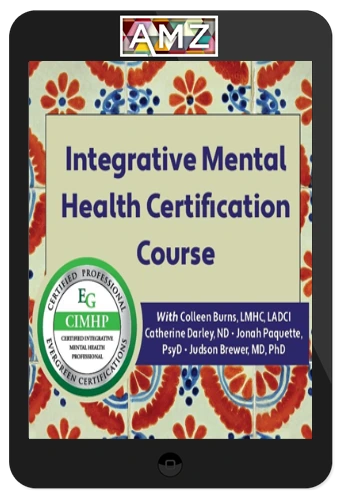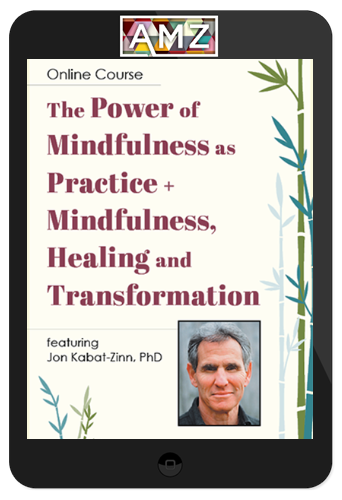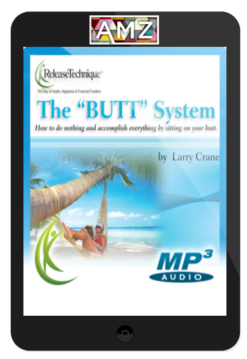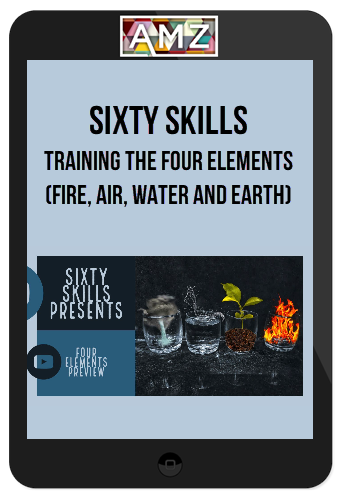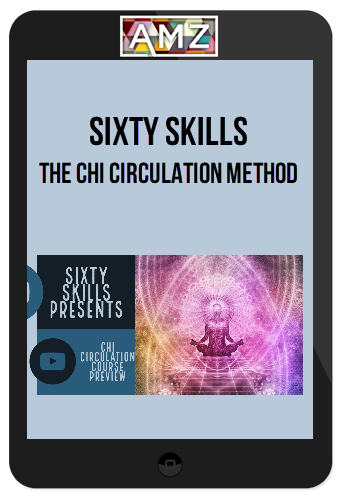Colleen A. Burns, Catherine Darley and Jonah Paquette, Jud Brewer – Integrative Mental Health Course
$99.00 $50.00
»Instant Delivery
Colleen A. Burns, Catherine Darley and Jonah Paquette, Jud Brewer – Integrative Mental Health Course
Integrative Mental Health Certification Course: Harness the Power of Nutritional and Complementary Medicine to Support Your Client’s Whole Health
Part 1: Effective Mind-Body Techniques
- Elicit the relaxation response to facilitate healing by discovering the connection between stress, impulse control, and neurotransmitters. Plus, learn how positive psychology can increase resilience to psychological stress and physical disorders.
- Six ways to fight stress fast
- Daily hacks to deal with depression & anxiety
- Simple skills to break free of the vicious cycle of negative thoughts
- Retrain the habit-prone brain because willpower isn’t enough
Part 1 Outline
STRESS MANAGEMENT AND BUILDING RESILIENCEY
- “Lifestyle” practices to support resiliency
- The stress experience and the mindbody connection
- Strategies for eliciting the relaxation response
- Neuroplasticity: Using the habituated brain
THE SYMPATHETIC AND PARASYMPATHETIC NERVOUS SYSTEMS
- Evidenced-based practices in integrative medicine to support behaviour change
- When and where to use mind-body approaches – inside and outside treatment
- Six ways to fight stress fast
POSITIVE PSYCHOLOGY AND GRATITUDE
- The science behind gratitude and abundance
- Self-compassion and renewal is the key to change
- Outline how positive psychology can increase resilience to psychological stress and physical disorders
- Gratitude & breaking free of the vicious cycle of negative thoughts
THE SCIENCE OF HABIT LOOPS
- How the brain forms new habits
- The connection between stress, impulse control, and neurotransmitters
- Why willpower isn’t enough!
- Brain-based tools for retraining the habit brain
MINDFULNESS-BASED COGNITIVE BEHAVIOURAL THERAPY
- Cognitive reappraisal and positive expectation to stop allostatic loading
- Master the O.N.E. technique
- Learn how to integrate tools into clinical practice via evidence-based techniques
- Techniques from mindful Cognitive Behaviour Therapy
MINDFULNESS AND MEDITATION
- Health-related benefits of contemporary meditative practices
- The science behind mindfulness and meditation, why meditation works, and how it changes your brain
- Teach clients to begin a daily practice to ease symptoms of depression & anxiety
Part 2: Gut, Brain & Body Strategies
- From weight management to stress management. To nutritional psychiatry (don’t forget food equals mood!) to exercise, sleep, and gut health, learn to translate your client’s mind-body connection to control inflammation, stress, insomnia and more.
- Printable questionnaire for clients rating their sleep habits
- Mood-boosting exercise strategies THAT REALLY WORK
- Tips to recognize nutritional deficiencies signs & symptoms
- Key nutrients for pain, mood, attention & cognition
Part 2 Outline
INFLAMMATION
- Inflammation and the mind-body connection
- Acute and chronic inflammation
- Stress, sleep, mood, nutrition
- Identify lifestyle factors contributing to inflammation
- The links of inflammation, to stress, disease, anxiety, and depression
- The enteric nervous system
GUT HEALTH, THE BRAIN AND THE MICROBIOME
- Sympathetic and parasympathetic nervous system
- Rest and digest vs. fight or flight
- A user’s guide to the gut-brain axis
- This axis that connects the brain, central nervous system, and the digestive tract is the basis for understanding our microbiome
NUTRITION AND MENTAL HEALTH
- Nutrition and links to mental and physical health
- Clinicians in the kitchen: Nutritional involvement in mood disorders
- Using motivational interviewing
- Evidenced-based education on how nutrition impacts mental health
- The role of sugar and fats on mood-related disorders
- Chemicals and additives in food and their effect on mental and physical health
- The link between nutrition and mental health
- Recognize nutritional deficiencies signs and symptoms
- Identify why food is medicine
- Food allergens, lactose intolerance, and mood
- Minerals & vitamins, magnesium, omega’s, B vitamins
- Supplements
- Clinical therapies
- Key nutrients for pain, mood, attention, and cognition
- Prebiotics and probiotics
PHYSICAL HEALTH AND IMPACTS ON MENTAL HEALTH
- Using exercise to reduce anxiety and depression
- Walking meditation
- Stretching
- Yoga
- Pilates
RESTORATIVE SLEEP & SLEEP HYGIENE
- Science of sleep, from weight to mood
- Sleeping pills and supplements
- Questionnaire for clients rating their sleep habits
Part 3: Cultural & Environmental Impacts on Health
- Your clients don’t live in a bubble! Help them heal and lead healthier lives, using time-tested and evidence-based strategies — even when working through recovery and toxic environments.
- Diet-based relapse prevention strategies
- Hormones every clinician should understand & signs they’re out of whack
- Ancient ways of eating and cooking
- Teach clients how to create a safe, non-toxic environment
Part 3 Outline
THE ANCIENT WISDOM OF OTHER CULTURES
- Ayurvedic and Chinese medicine
- Chinese medicine, acupressure, and acupuncture
- Ancient ways of eating and cooking
- Movement from Tai Chi to meditation
- Introduction to the concept of the Blue Zones & culture
LIVING IN A TOXIC ENVIRONMENT, PHYSICALLY AND EMOTIONALLY
- A toxic environment — it’s more than chemicals
- Protect the brain and body from toxins in food, air, water, and environment
- Checklist for clients
- How toxins can harm parts of the brain and body
- Key food groups that are involved in detoxification
- Teach clients how to create a safe, nontoxic environment
HORMONES
- Hormones every clinician should understand
- Signs your hormones are out-of-whack
- Develop a treatment plan to address hormonal shifts, including referrals
- Tools to help clients recognize when and if hormones are not functioning properly
- Steps to take when addressing with a medical provider
ON THE ROAD TO RECOVERY: SUBSTANCE MISUSE AND RELAPSE
- Support recovery with diet and lifestyle behaviours
- Relapse prevention techniques and tools
IMPACT OF DIET AND NUTRITION ON RECOVERY:
- How we feed ourselves is part of recovery
- Vitamin and mineral deficiencies
- Sugar and caffeine
- Self-medication hypotheses
- Nutrition impacts cravings
- Relapse prevention
- Normalize neurotransmitters and mood
- Insulin, glucose, B6 & B12
MINDFULNESS AND MEDITATION AID IN RECOVERY AND RELAPSE PREVENTION
- How mindfulness and meditation promote self-care
- Incorporating a meditative practice in recovery
- Adopting a healthy lifestyle
CBD WELLNESS AND EDUCATION
- The Natural Endocannabinoid System
- Your brain is a cannabinoid playground
- CBD terminology
- Regulation
- CBD with zero THC
- Teas, tinctures and terpenes
- Cautionary statements
SCOPE OF PRACTICE
- Clinician’s scope of practice, nature of the research, and limitations
- Focus on safe areas to intervene and make suggestions
- Conditions for referral
- When to recommend, suggest & limits of liability
- What clinicians can do with CIMHP
More courses from the same author: Colleen A. Burns, Catherine Darley and Jonah Paquette, Jud Brewer
